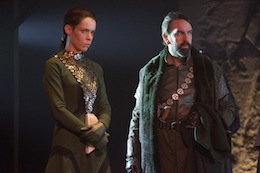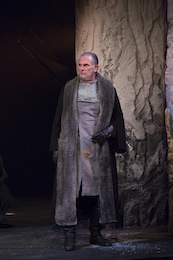Despite its relentless descent into madness and misery, King Lear is one of Shakespeare’s most accessible tragedies. Its hero is a remote and regal old man, a fearsome flawed fool but one made fond to us by his vulnerability. More importantly, the true conflict of the play is domestic. In its perfectly mirroring subplots, King Lear is really the story of a man outfoxed by his daughters, a brother betrayed, and the natural accession of one generation as another dies off.
 Selina Cartmell’s production for the Abbey Theatre certainly maintains this accessible thrust, though less in its approach to the text than in its spectacle. This is Blockbuster Shakespeare, with high production values that provide a filmic thrust to the classical material, and visual images and a soundscape that call to mind historical fantasies like Peter Jackson’s Lord of the Rings and HBOs Game of Thrones. Gaby Rooney’s costumes offer a gritty medieval armour of leather and fur; Garance Marneur’s two-tiered set is metaphoric and literal, evoking the craggy cliffs of Dover and the serpent's teeth that prove less sharp than a daughter’s rejection; while Conor Linehan’s score in forces an epic feel. In the interlude between scenes in the first three acts, as the action shifts between courts and conspiracies, you almost forget you are in the theatre.
Selina Cartmell’s production for the Abbey Theatre certainly maintains this accessible thrust, though less in its approach to the text than in its spectacle. This is Blockbuster Shakespeare, with high production values that provide a filmic thrust to the classical material, and visual images and a soundscape that call to mind historical fantasies like Peter Jackson’s Lord of the Rings and HBOs Game of Thrones. Gaby Rooney’s costumes offer a gritty medieval armour of leather and fur; Garance Marneur’s two-tiered set is metaphoric and literal, evoking the craggy cliffs of Dover and the serpent's teeth that prove less sharp than a daughter’s rejection; while Conor Linehan’s score in forces an epic feel. In the interlude between scenes in the first three acts, as the action shifts between courts and conspiracies, you almost forget you are in the theatre.
Cartmell has history with King Lear, having previously directed Marina Carr’s response to it, The Cordelia Dream, at the fabulous Wilton’s Music Hall for the RSC in 2008. She knows the play well, and some of her textual interpretations are extremely interesting. The King of France speaks through an interpreter, Goneril is played as a mother bereaved, and the cipher-character of Cordelia is recast as a martyred Joan of Arc. However, few of these ideas are followed through, and the inconsistency extends to Cartmell’s choreography of the production too. Liz Roche’s movement direction, for example, is employed to give the hooded, cloaked ensemble an eerie gravity, but they recede into the wings in the second half, and eventually disappear entirely. Are they shadows of Lear’s shattered mind, oppressive political forces stalking him, or the Deatheaters who have wandered in from Harry Potter? And what about those two wolfhounds who scurry across the stage on two occasions between scenes? Their cameo is so brief and so pointless, we aren’t even sure we are supposed to see them. Indeed, there are so many unfinished ideas here that Cartmell’s production manages to be both distinct in its vision, but unsure of what it actually wants to say.
 So, this is not a King Lear that has anything to say about anything in particular, and yet it manages to produce a crystal clear rendering from its restrained ensemble. The cast are led by the magnificently abject Owen Roe, who brings us on a journey from corpulent arrogance to spiritual nakedness with emotional elegance. Although the opening scene creates a play-within-a-play – Tina Kellegher’s Goneril and Caoilfhionn Dunne’s Regan are masters of theatrical deception, Beth Cooke’s Cordelia refuses to perform – Cartmell and her actors refuse to make a melodrama from the highly-charged, murderous climate. Hugh O’Conor, meanwhile, brings a psychological history to the bit-part of the Fool. Aaron Monaghan is memorable as both the good Edgar and his mad alter-ego Poor Tom, though the inescapable shadow of Andy Serkis’s Gollum is unfortunate. Finally, Lorcan Cranitch’s Gloucester and Sean Campion’s Earl of Kent remind us of the lyricism and rhythm that the Irish voice can bring to Shakespeare.
So, this is not a King Lear that has anything to say about anything in particular, and yet it manages to produce a crystal clear rendering from its restrained ensemble. The cast are led by the magnificently abject Owen Roe, who brings us on a journey from corpulent arrogance to spiritual nakedness with emotional elegance. Although the opening scene creates a play-within-a-play – Tina Kellegher’s Goneril and Caoilfhionn Dunne’s Regan are masters of theatrical deception, Beth Cooke’s Cordelia refuses to perform – Cartmell and her actors refuse to make a melodrama from the highly-charged, murderous climate. Hugh O’Conor, meanwhile, brings a psychological history to the bit-part of the Fool. Aaron Monaghan is memorable as both the good Edgar and his mad alter-ego Poor Tom, though the inescapable shadow of Andy Serkis’s Gollum is unfortunate. Finally, Lorcan Cranitch’s Gloucester and Sean Campion’s Earl of Kent remind us of the lyricism and rhythm that the Irish voice can bring to Shakespeare.
This all makes for an enjoyable, if frustrating, evening at the theatre. The production’s emotional landscape is never more than compelling, and its visual aspect is involving, immersive and often quite beautiful. However, the journey of the play is entirely more pure than what is offered here: Lear loses everything on the storm-blown heath but he emerges unshackled from worldly effects and he can see the world clearer. There is a lesson there.
Sara Keating writes about theatre for The Irish Times and The Sunday Business Post.